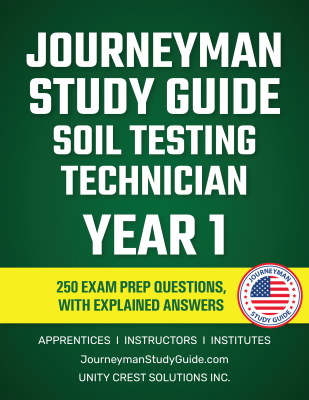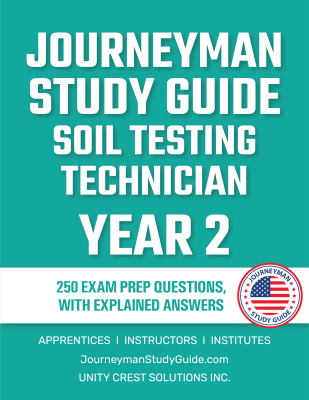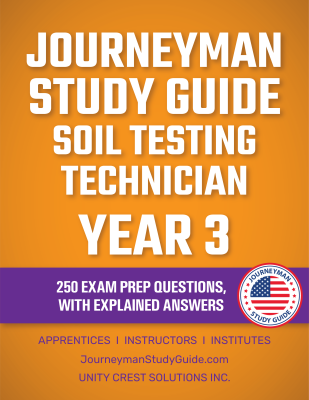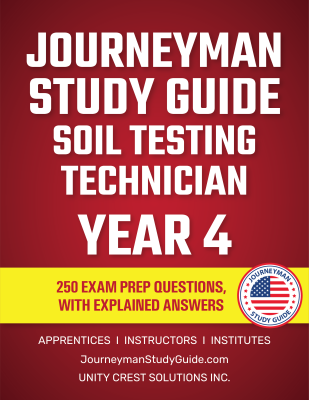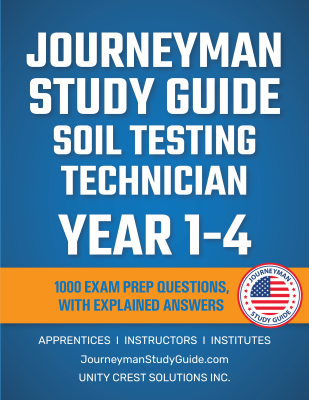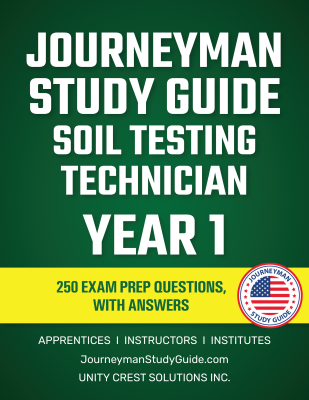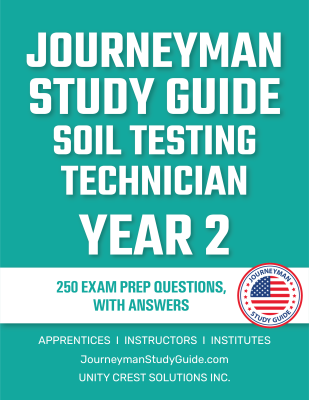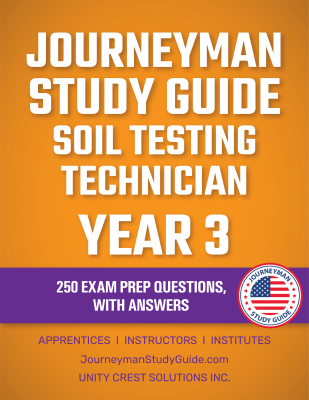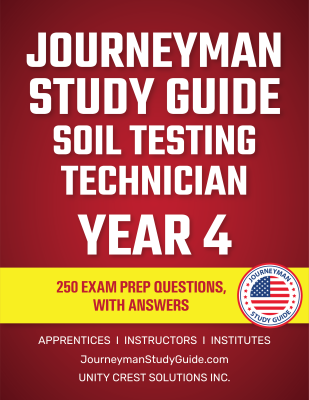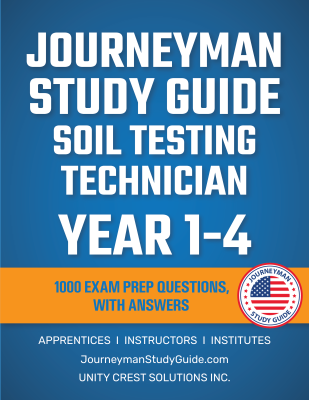Questions, Answers, & Explanations
Get clear explanations behind every answer, perfect for deeper learning and more thorough exam preparation.
Site Updates in Progress: Things might look different as we work on enhancing your experience.
Soil Testing Technicians play an essential role in construction, agriculture, and environmental projects across the United States. Their main job is to collect, test, and analyze soil samples to determine properties such as strength, density, composition, and moisture content. This helps engineers, builders, and environmental experts make safe and informed decisions before starting a project.
In the construction industry, Soil Testing Technicians help ensure that building foundations are placed on stable ground. They help prevent costly mistakes by checking if the soil can support the weight of a structure. In road building, they check for soil compaction and drainage. In agriculture, they analyze soil nutrients to help farmers decide what fertilizers to use for healthy crops. In environmental work, they test for contamination or pollution. No matter the field, their work supports public safety and sustainability.
Technicians often work closely with civil engineers, geotechnical engineers, agricultural consultants, and site inspectors. They typically begin their day by going to a job site, using hand tools or drilling rigs to collect soil from different depths. Once samples are collected, they return to a lab to run tests like sieve analysis, moisture content testing, compaction testing, and Atterberg limits. The results are carefully recorded and used to create reports that guide engineering or construction decisions.
A Soil Testing Technician must be detail-oriented and follow strict testing procedures to ensure accuracy. Many of the tests follow standards set by ASTM (American Society for Testing and Materials) and AASHTO (American Association of State Highway and Transportation Officials). Knowing how to read and write simple technical reports, handle data, and communicate findings is also important.
Work environments vary depending on the job. Some technicians spend most of their time in the field under different weather conditions. Others spend more time in a lab setting. Fieldwork can involve traveling to construction sites, farms, or remediation zones, often requiring physical effort to dig or drill for samples. Lab work involves using tools like ovens, balances, compactors, and sieves. Safety is always a top priority, and technicians must wear protective gear and follow safety protocols at all times.
The demand for Soil Testing Technicians is strong throughout the U.S., especially in areas with active construction, roadwork, farming, or environmental cleanup projects. States like Texas, California, Florida, and North Carolina often have high demand due to ongoing development. Many Soil Testing Technicians are hired by geotechnical firms, construction companies, environmental labs, agricultural service providers, or state transportation departments.
To enter this trade, many technicians start with a high school diploma and gain on-the-job training. Some employers prefer candidates with a certificate or associate degree in construction technology, geology, civil engineering, or environmental science. Several trade schools and community colleges across the U.S. offer soil testing courses or related technical training. Certification is not always required but can help you stand out. Organizations like NICET (National Institute for Certification in Engineering Technologies) offer certifications in Construction Materials Testing, including soils.
The job is ideal for someone who enjoys working outdoors, solving problems, and working with data. It offers a good mix of field and lab work and provides opportunities to grow into supervisory or specialist roles over time. With experience, a Soil Testing Technician can move into roles such as Geotechnical Field Supervisor, Lab Manager, or Construction Quality Control Specialist.
In summary, Soil Testing Technicians are critical in supporting safe construction, healthy agriculture, and clean environments. They provide the data that engineers and builders rely on to make smart decisions. As infrastructure grows and environmental standards increase, this trade will continue to be valuable. It’s a solid career choice with room to grow, especially for those who enjoy practical, hands-on work and want to make a difference in the built environment.
To become a Soil Testing Technician in the United States, you may need to pass a certification exam depending on your state or employer requirements. While not all companies require formal certification, many construction and engineering firms prefer hiring technicians who have proven knowledge through standardized testing. These exams help ensure that technicians understand proper soil sampling techniques, lab testing procedures, and reporting standards.
One of the most recognized certifications for Soil Testing Technicians is offered by the National Institute for Certification in Engineering Technologies (NICET). NICET provides certification in Construction Materials Testing (CMT) – Soils, which is commonly accepted across the country. This certification is structured into levels, from Level I (entry-level) to Level IV (advanced supervisory roles). Most technicians begin by taking the NICET Level I or Level II exam, depending on their work experience.
NICET Soils Certification – Level I & II Overview
The NICET Level I exam focuses on basic soil sampling procedures and simple field and laboratory testing. It is ideal for those new to the field. The Level II exam is more advanced and includes soil classification, laboratory practices, reporting standards, and quality control.
Exam format:
Core topics covered:
For Levels III and IV, candidates must have more on-the-job experience and take additional exams related to project supervision, report interpretation, and material specification knowledge.
Application and Eligibility
To apply for the NICET Soil Testing certification:
There are no strict educational prerequisites to take the exam. However, having a high school diploma and basic knowledge in math, science, and engineering concepts will help. Many candidates also complete on-the-job training or technical courses before applying.
Practice and Preparation
To prepare for the exam, it is helpful to use study materials that include practice questions, explanations, and mock tests. That’s where our digital products come in:
These tools are designed specifically for trades like Soil Testing Technician and help candidates gain confidence before their exam day. You can preview the Q&A and Q&A with Explanation products on our website to see the format before purchasing.
State and Employer Requirements
Some states, such as California, Florida, or Texas, may have their own certification or licensing standards, especially for technicians working on public infrastructure projects. Always check with your local Department of Transportation (DOT) or employer to see which exam is required. Large construction and engineering companies often ask for NICET certification or equivalent credentials for hiring or promotion.
In summary, while not always mandatory, passing a Soil Testing Technician exam—such as those offered by NICET—can open more job opportunities, increase your earning potential, and demonstrate your professionalism in the field. With the right preparation and tools, success is within reach.
Preparing for the Soil Testing Technician exam in the U.S. involves understanding both the technical knowledge and hands-on procedures used in the field. Most certification exams, like those offered by NICET (National Institute for Certification in Engineering Technologies), follow a multiple-choice format. These questions are designed to test your understanding of soil types, lab tests, field procedures, and safety practices.
Whether you're studying for NICET Construction Materials Testing – Soils Level I or Level II, the questions follow a practical approach. They focus on the skills and scenarios you would actually face while working on construction sites or in a geotechnical lab. Being familiar with standard procedures from ASTM and AASHTO is also important, as many questions refer to those testing guidelines.
What Kind of Questions Are Asked?
Most questions are multiple choice with four possible answers. Some questions are direct, while others involve short work scenarios or diagrams. Here's what you can expect:
Sample Question 1 – Soil Classification
Which of the following soils has the lowest permeability?
A. Sand
B. Silt
C. Gravel
D. Clay
Answer: D. Clay
This type of question checks your understanding of soil behavior, especially how water flows through different materials.
Sample Question 2 – Field Test
The Proctor Test is used to determine:
A. Soil pH
B. Optimum moisture and maximum density
C. Water table depth
D. Soil color
Answer: B. Optimum moisture and maximum density
Proctor tests are a core topic in soil testing, and you should expect to see questions on procedures and results.
Sample Question 3 – Lab Equipment
Which tool is used to separate soil particles by size in a lab?
A. Hydrometer
B. Sieve set
C. Core cutter
D. Pocket penetrometer
Answer: B. Sieve set
Lab procedure knowledge is a major part of the exam. Questions like this help confirm that you know how to perform basic tests.
How to Prepare for Exam Questions
To succeed on the Soil Testing Technician exam, it’s important to focus on five key areas:
Tools to Help You Study
The Journeyman Study Guide offers three helpful tools to prepare you for the Soil Testing Technician exam:
These products are available as downloadable PDFs, and the Q&A items come with free previews so you can see what you're getting before you commit.
Final Tip
When practicing for the exam, don’t just memorize answers—understand the concepts. Many questions are phrased differently but test the same ideas. Practice in short sessions regularly, and try to time yourself to build test-day confidence.
In short, the exam questions for Soil Testing Technicians are all about real-world knowledge. If you study consistently using practice materials and understand the basics of soil behavior, sampling, and testing methods, you’ll be well-prepared to pass.
A typical day for a Soil Testing Technician in the U.S. starts early and involves a good mix of outdoor work and time spent in the lab. Whether you’re working on a construction site, a farm, or a highway project, your main job is to make sure the soil is safe and suitable for the job at hand. From collecting samples to running tests, the work you do helps engineers, contractors, and project managers make smart, safe decisions.
Morning: Site Preparation and Sample Collection
Most Soil Testing Technicians begin their day by heading to the job site. This could be a new building site, a road construction area, or even farmland. You’ll start by reviewing instructions for where to collect soil and how deep to go. You may use simple tools like a shovel or soil auger, or work with larger equipment such as a drill rig.
Once on site, you’ll measure and record the location and depth of each sample. Depending on the soil type, digging can be easy or tough. You'll carefully place each sample in a labeled container or bag, making sure it stays in good condition for testing. Safety is a big part of this process—you’ll need to wear protective boots, gloves, hard hats, and possibly a reflective vest, depending on the site rules.
In some jobs, you may also conduct field tests right on-site. These might include a moisture content test, pocket penetrometer reading, or compaction test using a nuclear density gauge. Each reading is logged accurately in a field notebook or tablet, as this data will be reviewed by engineers later.
Midday: Travel and Lab Testing
After collecting samples, you’ll travel back to the lab. Depending on how far the site is, this could take a few minutes or a couple of hours. Once at the lab, it’s time to prepare the soil samples for analysis. You may begin drying them in an oven, running a sieve analysis, or performing a Proctor test to determine the soil’s compaction limits.
Lab work requires attention to detail. You’ll use scales, compactors, moisture balances, and other tools. Every test must be done according to national standards like ASTM or AASHTO, and accuracy is key. You’ll document your findings and check that results make sense before submitting them to a supervisor or engineer.
Afternoon: Reporting and Cleanup
As the day winds down, you'll prepare reports based on your field and lab data. Some companies use digital forms or software; others use printed logs. You may also need to upload your results to a shared database or email them to the project team. Reporting is a big part of the job and helps guide decisions about whether the soil is ready for construction or needs improvement.
Before leaving for the day, you’ll clean your tools, restock supplies, and get ready for the next job. If more testing is needed at the same site, you’ll plan to return the next day.
Work Conditions and Schedules
Work hours can vary, but most Soil Testing Technicians work full-time, typically Monday through Friday. Some jobs may require weekend or evening work, especially when dealing with urgent construction schedules or weather delays.
The job requires physical strength, especially during fieldwork, and you must be okay working in hot sun, rain, or cold. On the flip side, the variety of tasks and changing locations can make the work more enjoyable and less repetitive.
Teamwork and Communication
Although much of your work is done independently, you’ll often interact with engineers, foremen, and other technicians. Good communication is important when sharing test results or asking questions about the project site.
In summary, a day in the life of a Soil Testing Technician is active, hands-on, and full of problem-solving. From digging in the dirt to analyzing lab results, each task plays a part in keeping construction and environmental projects safe and successful. If you enjoy working outdoors, paying attention to details, and doing practical science, this career may be a perfect fit.
The career path for a Soil Testing Technician in the U.S. is full of opportunities for growth, learning, and advancement. Whether you start with just a high school diploma or come from a technical program, this trade offers many ways to build a long-term career. With hands-on experience and the right certifications, you can move from entry-level roles to supervisory or specialized positions in construction, environmental science, or geotechnical engineering.
Starting Out
Most people begin their career in this field as entry-level Soil Testing Technicians. These positions are often open to those with a high school diploma or GED. Some basic knowledge of math and science is helpful, but most training is done on the job. As a new technician, your first duties usually include collecting soil samples, labeling containers, helping with simple lab tests, and learning safety rules.
Many employers also provide training in the use of field equipment, like nuclear density gauges or moisture testers. It’s important to learn proper testing procedures, how to follow ASTM or AASHTO standards, and how to record your findings accurately.
Gaining Experience and Certifications
As you build experience, you can move into more advanced technician roles. Most companies encourage technicians to earn industry certifications. One of the most common options in the U.S. is the NICET (National Institute for Certification in Engineering Technologies) certification in Construction Materials Testing – Soils.
With certification, you can qualify for higher-level tasks like leading field investigations, performing detailed lab analysis, and writing technical reports. NICET has multiple levels—starting with Level I (basic) and moving up to Level IV (expert level). As you pass each level and gain more field experience, your value in the job market increases.
Another advantage of certification is that it can open the door to work on larger, more complex projects—such as highways, airports, or federal buildings—where certified technicians are often required.
Advancing to Senior Technician or Supervisor Roles
After 3 to 5 years of experience and earning certifications, many Soil Testing Technicians move into senior or lead technician roles. These jobs involve supervising a small team, reviewing lab data, preparing client reports, and coordinating with engineers. Some technicians also manage inventory, order supplies, or oversee lab maintenance.
Senior technicians often work closely with civil engineers, project managers, and inspectors. Communication skills become even more important in these roles, especially when explaining test results or solving site problems.
Moving into Management or Specialization
With continued experience, technicians can become lab managers, field supervisors, or project coordinators. In these roles, you might be responsible for scheduling crews, reviewing all test data, training new hires, or handling quality control. Salaries are higher at this level, and many companies offer full benefits.
Some technicians choose to specialize in a certain type of soil testing, such as geotechnical testing, environmental site assessments, or agricultural soil analysis. Others go back to school to study civil engineering, geology, or environmental science to qualify for professional roles in those fields.
Related Career Opportunities
The skills you gain as a Soil Testing Technician also apply to related careers such as:
Some of these paths require more education, but your field experience will give you a strong foundation to grow from.
In summary, the career path for a Soil Testing Technician in the U.S. is flexible and rewarding. You can start with little experience, gain valuable certifications like NICET, and grow into roles with more responsibility and better pay. Whether you want to stay in testing, move into supervision, or shift into a related trade, the soil testing field offers steady work, career growth, and strong job demand across the country.
Soil Testing Technicians in the U.S. earn a solid and steady income, with opportunities to increase wages through experience, certification, and added responsibilities. This trade is essential in construction, environmental, and agricultural industries, which means there is regular demand and room to grow. Whether you're starting out or have several years of experience, this career path offers competitive wages and job stability.
Entry-Level Wages
When starting out as an entry-level Soil Testing Technician, you can expect to earn between $16 and $22 per hour in most states. That’s about $33,000 to $45,000 per year for full-time work. Wages at this level depend on your location, employer, and whether you already have certifications like NICET Level I. Areas with more construction projects, such as Texas, California, and Florida, often offer higher starting pay due to higher demand.
At the entry level, you will mostly assist in collecting soil samples, conducting basic tests, and handling lab equipment. While the pay may be lower at first, there are plenty of opportunities to grow with experience and training.
Mid-Level Wages
After gaining a few years of experience and earning certifications such as NICET Level II, your pay can increase significantly. Mid-level Soil Testing Technicians often earn $22 to $30 per hour, or roughly $45,000 to $60,000 per year. At this stage, technicians are trusted with more complex tasks, including advanced field and lab testing, data reporting, and supervising junior technicians.
Employers often reward technicians who can work independently, follow detailed procedures, and complete reports on time. Those who show reliability and technical skill often see wage increases or bonuses, especially on high-budget projects.
Experienced and Senior-Level Wages
With five or more years of experience and NICET Level III or IV certification, you may qualify for senior or supervisory roles. Senior Soil Testing Technicians or Lab Managers can earn between $30 and $40 per hour, which equals $60,000 to $85,000 or more annually.
These positions involve more responsibility—such as leading field crews, reviewing test results for accuracy, training new technicians, and working directly with engineers or clients. If you manage a team or help oversee large projects (such as highways or commercial buildings), your salary can increase even further, especially in union roles or government contracts.
Factors That Affect Wages
Several factors affect how much you can earn as a Soil Testing Technician:
Additional Benefits
In addition to hourly wages, many full-time Soil Testing Technicians receive:
In conclusion, Soil Testing Technicians can expect fair wages and room for financial growth in the U.S. With certification and experience, your income can grow from around $35,000 to well over $70,000 per year. For those who enjoy practical, hands-on work with science and engineering, this trade offers not just a paycheck—but a stable, rewarding career path with long-term benefits.
Soil Testing Technicians in the U.S. rely on a variety of tools and resources to do their job safely and correctly. Whether working in the field or inside a laboratory, using the right equipment is key to collecting accurate soil data. The tools you use will depend on the type of test being performed, the location of the site, and the job’s overall purpose—such as construction, agriculture, or environmental monitoring.
This section outlines the most common tools and resources used by Soil Testing Technicians in the U.S., along with where to find training and study materials.
Field Tools
Fieldwork is a big part of the job, especially when gathering soil samples. These are the most common tools used on job sites:
Lab Equipment
After field samples are collected, testing is done in a soil lab. These tools help determine key properties like density, moisture, and grain size:
Safety Gear
Working around heavy equipment and chemicals requires proper safety tools:
Study Materials & Learning Resources
If you're preparing for certification exams such as the NICET Construction Materials Testing – Soils, having the right study tools is important. Here are some helpful resources:
All of these products are downloadable and designed to help you pass the exam with confidence.
Where to Buy Tools
Most field and lab tools can be purchased from specialized suppliers like:
These companies serve customers across the U.S. and offer delivery or pickup options.
In conclusion, Soil Testing Technicians use a wide range of tools—from augers and lab balances to safety gear and exam prep resources. Understanding how to use each tool correctly and safely is essential for performing accurate tests and building a successful career.
To start a career as a Soil Testing Technician in the U.S., you don’t always need a four-year degree. Most technicians begin with a high school diploma or GED and then get trained on the job. However, going through an education program or earning a certificate from a technical school or community college can help you get hired faster and qualify for better pay. These programs teach the basics of soil testing, safety, construction materials, and lab procedures, giving you a strong foundation to build your career.
Community Colleges and Technical Schools
Many community colleges across the U.S. offer programs related to Construction Materials Testing, Geotechnical Engineering Technology, Environmental Science, or Civil Engineering Technology. These programs often include courses on soil science, lab testing, field sampling, and construction safety.
Here are some examples of schools offering relevant programs:
Most of these programs can be completed in one to two years and offer certificates or associate degrees. Some schools also offer night or weekend classes for working adults.
On-the-Job Training
In many cases, employers will hire you as a trainee and teach you the basics on-site. This is especially common for entry-level roles. During on-the-job training, you’ll learn how to collect soil samples, use testing tools, follow safety guidelines, and document your results. This hands-on experience is valuable and may be enough to get started, but combining it with formal education or certification will improve your long-term prospects.
Certification Courses
Some organizations offer short-term training programs that focus on certification preparation, especially for exams like NICET (National Institute for Certification in Engineering Technologies) in Construction Materials Testing – Soils. These programs can be taken online or in person and are great for people who already work in the field but want to boost their qualifications.
A few well-known options include:
These courses usually focus on topics like soil classification, Proctor tests, compaction testing, moisture content, and lab safety. They are a great step toward earning credentials that many employers value.
Online Learning Options
If you need a flexible way to learn, online training programs are a great choice. Some platforms offer soil science or construction materials testing courses, which you can complete at your own pace. You can also use study products from the Journeyman Study Guide website:
These digital resources help prepare you for certification tests and improve your understanding of real-world job tasks. You can download them and start studying anytime.
Summary
There are many ways to get the education you need to become a Soil Testing Technician in the U.S. Whether you choose a community college program, certification course, or learn on the job, what matters most is gaining the right knowledge and hands-on skills. With the growing need for soil testing in construction, agriculture, and environmental work, now is a great time to start your training and build a successful career.
Soil Testing Technicians are in demand across the U.S., especially in industries like construction, environmental consulting, and civil engineering. While this trade is often not as widely unionized as others, there are still unions and professional groups that support soil testing professionals. In addition, there are many employers—large and small—who regularly hire Soil Testing Technicians for both field and lab positions. Knowing where to find support and job opportunities can help you grow a long-term career in this field.
Unions and Professional Organizations
In the U.S., Soil Testing Technicians may not always be part of a specific union just for their role. However, many work under broader construction or engineering unions or join professional associations that support their field. These organizations offer training programs, job protection, better wages, and safety resources.
1. International Union of Operating Engineers (IUOE)
In some states, Soil Testing Technicians who operate heavy machinery or support geotechnical fieldwork may work under the IUOE. This union represents workers in construction and infrastructure and may include soil testing professionals on large projects like highways, airports, and bridges.
2. Laborers’ International Union of North America (LIUNA)
In areas where soil testing is performed on government or public works projects, some Soil Testing Technicians may fall under LIUNA representation. This union supports laborers working in transportation and construction sectors.
3. American Society of Civil Engineers (ASCE)
While not a union, ASCE is a respected professional organization. Technicians who want to stay connected to the civil engineering community can join ASCE for access to publications, job boards, and continuing education.
4. NICET (National Institute for Certification in Engineering Technologies)
NICET is not a union but plays a key role in certifying Soil Testing Technicians. Many employers prefer or require NICET certification, and membership can help technicians meet job requirements and advance in their careers.
These groups offer valuable support through networking, certification guidance, safety training, and advocacy.
Major Employers
Soil Testing Technicians are hired by a wide range of companies and government agencies across the U.S. These include geotechnical firms, construction companies, environmental consultants, and state departments of transportation.
1. Geotechnical & Engineering Firms
These companies specialize in testing soil for buildings, roads, and bridges. Examples include:
These employers offer both field and lab roles and often help technicians earn NICET certification.
2. Construction and Infrastructure Companies
Large construction firms that handle commercial and public infrastructure projects often employ Soil Testing Technicians to ensure the ground is suitable before work begins. Firms like:
may hire technicians directly or work with subcontractors that specialize in soil testing.
3. Environmental and Agricultural Labs
Technicians working in these labs analyze soil for pollution, contamination, or nutrient levels. Employers include:
4. Government Agencies
State and local government agencies also employ Soil Testing Technicians to support infrastructure maintenance and construction. Common employers include:
Tips for Getting Hired
In summary, Soil Testing Technicians in the U.S. have access to a wide network of employers and support organizations. Whether you’re working for a private lab, a large construction firm, or a government agency, there are many ways to grow in this career. Joining a union or professional group can give you added security and advancement opportunities in this essential trade.
The role of a Soil Testing Technician is one of the most important—and often overlooked—trades in the construction and environmental industries. While this job might not be as well-known as carpenters or electricians, it plays a big role in keeping buildings, roads, bridges, and even farms safe and successful. If you're looking for a career that mixes hands-on work, science, and real-world results, this trade could be the perfect fit.
Why This Trade Matters
Before any major construction project begins, one of the first steps is to test the soil. Why? Because everything—from houses to highways—needs a strong, stable foundation. Soil that is too loose, too wet, or contaminated can lead to unsafe conditions, delays, or even structural failure. Soil Testing Technicians make sure the ground is ready and reliable.
This role is also essential in farming and environmental protection. In agriculture, testing helps farmers know what nutrients their soil needs. In environmental work, soil tests can identify pollution and guide cleanup efforts.
Soil Testing Technicians help protect people, the environment, and investments. Their work supports safe construction, smart land use, and better decision-making.
Traits of a Good Soil Testing Technician
If you enjoy working outdoors, using tools, and solving problems, this trade might be a good match for you. Here are some traits that help you succeed:
Where the Work Takes You
Soil Testing Technicians work in a variety of settings. One day you might be at a construction site helping to prepare the ground for a new building. Another day, you could be in a lab, running tests and recording data. Some projects are local, while others require travel to remote areas, farms, or industrial zones.
This variety keeps the job interesting. You’re not stuck in one place. Plus, you get to see real results—like watching a building rise on ground you helped evaluate.
Job Security and Future Growth
The U.S. continues to invest in infrastructure—new roads, bridges, housing developments, and energy projects. That means steady demand for skilled Soil Testing Technicians. Environmental concerns are also increasing the need for soil monitoring on farms, near factories, and in water protection zones.
Employers value technicians who can follow standards, work safely, and provide accurate test results. With more experience and certifications, you can move up in the field or shift into related roles like lab manager, environmental technician, or construction inspector.
Learning and Advancing
This trade is accessible. You don’t need a four-year college degree to get started. Many technicians begin with just a high school diploma and receive on-the-job training. Still, going to a community college or earning certifications like NICET Construction Materials Testing – Soils can help you move up faster and earn more.
To help you study and prepare for exams, the Journeyman Study Guide offers three digital tools:
These tools are designed for people in the trades, with clear language and helpful examples.
Final Thoughts
Becoming a Soil Testing Technician is a smart choice if you want a hands-on career that makes a difference. You’ll help keep buildings safe, support smart farming, and protect the environment. The job is steady, the skills are valuable, and there’s plenty of room to grow. If you like solving problems, working with your hands, and being part of a team that builds the future—you’ll fit right in.
Get clear explanations behind every answer, perfect for deeper learning and more thorough exam preparation.
Quick and easy practice to test your knowledge anytime, anywhere—ideal for simple, on-the-go preparation.

